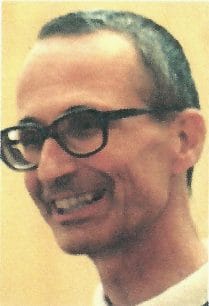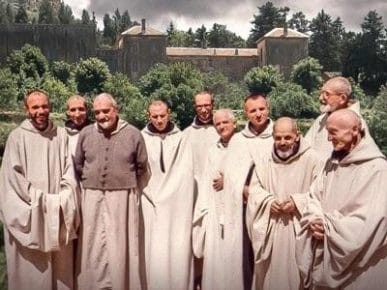 I came across a letter of Fr. Christian de Chergé a few days ago, on his 20th death anniversary. Christian was the Prior of the community of Trappist monks of the monastery of Nostra Signora dell’Atlas in Tibhirine (90 km from Algiers). In 1996, he and six other monks were kidnapped and then killed. On 1 August, Bishop Pierre Claverie, the Bishop of Orano was killed. That was really a “black decade,” as people called the civil war that exploded in the1990s. The monks were French and like the other “foreigners” were the direct targets of the “ mountain brothers,” name that referred to all those who had gone into hiding to take up their arms following the annulment of the 1992 elections. The Islamic Salvation Front, a political party that was dispersed and declared illegal, was about to win the elections. In my mind I often see their smiling faces, during those moments we lived together. We all took part in that particular vocation of the Church in that country, to which we felt we had been sent to testify to the Gospel, at the service of those people. It was a simple, poor Church, but its testimony shone in the hearts of many friends, mostly Muslims. Already then in Algiers, 99.99% of the population followed Islam. The Archbishop of Algiers, Paul Desfarges, said that, “The Church is for the people, a Church of Encounters.” But going back to the letter of 3 December 1994, it seemed to me like meeting Christian once again, or one of the monks in our focolare house in Tlemcen, where they used to spend a night, to then resume the journey towards the monastery they were about to found in Fèz, Morocco. Those were evenings of intense dialogue and joy of getting together, feeling like brothers and of sharing and understanding, in this mutual commitment toward the people that hosted us. Even if we had different callings, our hearts beat in unison.
I came across a letter of Fr. Christian de Chergé a few days ago, on his 20th death anniversary. Christian was the Prior of the community of Trappist monks of the monastery of Nostra Signora dell’Atlas in Tibhirine (90 km from Algiers). In 1996, he and six other monks were kidnapped and then killed. On 1 August, Bishop Pierre Claverie, the Bishop of Orano was killed. That was really a “black decade,” as people called the civil war that exploded in the1990s. The monks were French and like the other “foreigners” were the direct targets of the “ mountain brothers,” name that referred to all those who had gone into hiding to take up their arms following the annulment of the 1992 elections. The Islamic Salvation Front, a political party that was dispersed and declared illegal, was about to win the elections. In my mind I often see their smiling faces, during those moments we lived together. We all took part in that particular vocation of the Church in that country, to which we felt we had been sent to testify to the Gospel, at the service of those people. It was a simple, poor Church, but its testimony shone in the hearts of many friends, mostly Muslims. Already then in Algiers, 99.99% of the population followed Islam. The Archbishop of Algiers, Paul Desfarges, said that, “The Church is for the people, a Church of Encounters.” But going back to the letter of 3 December 1994, it seemed to me like meeting Christian once again, or one of the monks in our focolare house in Tlemcen, where they used to spend a night, to then resume the journey towards the monastery they were about to found in Fèz, Morocco. Those were evenings of intense dialogue and joy of getting together, feeling like brothers and of sharing and understanding, in this mutual commitment toward the people that hosted us. Even if we had different callings, our hearts beat in unison.  That atmosphere of danger surrounding us, encouraged us to go ahead. In fact, there was talk about a possible momentous departure of the members of the focolare of Tlemcen, which then did not occur. And Christian had written: «We all thought that you would stay longer to testify to a convivial offer, a boundless sharing of life, and a friendly openness that enables our hearts to vibrate in unison beyond the barriers of religious affiliations. You made the message of the Gospel your very own and you have deeply imprinted this message among us. And we rejoice with you for this greater humanity which your Charism has given to our Church. It was such a joy to meet at your “focolare” house. Many monks were able to make use of your hospitality when they passed through on their way to Fez. All of us still savour the thought of experiencing it all again! In these times we all need to be able to count on this “fire” kept alive in the common room. It will be a bit colder at Christmas if you will no longer be here… Our lives are in God’s hands… and our motives to remain, conform to those that have allowed us to live here. For you, as for us, the situation has not changed. THANKS once again to each of you and our fraternal communion today and for always. Christian». We had talked about the courage to remain… but for those who, like us had lived that harsh situation in person, I would rather speak of the courage to remain faithful to a calling and share it with a section of humanity, which we already felt an integral part of. It was a Fidelity of love. In the hearts of those who knew the monks, Bishop Claverie, or the other nuns and religious killed in those years in Algiers, they continue to speak to us of the Gospel lived and deep friendships with a people they had made their own. Giorgio Antoniazzi
That atmosphere of danger surrounding us, encouraged us to go ahead. In fact, there was talk about a possible momentous departure of the members of the focolare of Tlemcen, which then did not occur. And Christian had written: «We all thought that you would stay longer to testify to a convivial offer, a boundless sharing of life, and a friendly openness that enables our hearts to vibrate in unison beyond the barriers of religious affiliations. You made the message of the Gospel your very own and you have deeply imprinted this message among us. And we rejoice with you for this greater humanity which your Charism has given to our Church. It was such a joy to meet at your “focolare” house. Many monks were able to make use of your hospitality when they passed through on their way to Fez. All of us still savour the thought of experiencing it all again! In these times we all need to be able to count on this “fire” kept alive in the common room. It will be a bit colder at Christmas if you will no longer be here… Our lives are in God’s hands… and our motives to remain, conform to those that have allowed us to live here. For you, as for us, the situation has not changed. THANKS once again to each of you and our fraternal communion today and for always. Christian». We had talked about the courage to remain… but for those who, like us had lived that harsh situation in person, I would rather speak of the courage to remain faithful to a calling and share it with a section of humanity, which we already felt an integral part of. It was a Fidelity of love. In the hearts of those who knew the monks, Bishop Claverie, or the other nuns and religious killed in those years in Algiers, they continue to speak to us of the Gospel lived and deep friendships with a people they had made their own. Giorgio Antoniazzi
Put love into practice
Put love into practice




0 Comments